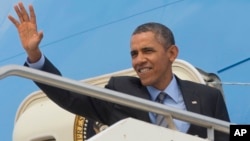JERUSALEM —
President Barack Obama arrives in Saudi Arabia Friday at the end of a weeklong trip to Europe. High on the agenda are Syria, the turmoil in the region and the faltering Middle East peace talks.
President Obama's visit to Saudi Arabia comes amid growing strains in relations with the United States and rifts among Middle Eastern nations due to the widening conflict in Syria.
A U.S. diplomat based in Saudi Arabia said the trip was aimed at advancing what was termed a range of common security-related interests, including the situation in Iran and Syria, talks between Israel and the Palestinians and the effort to counter violent extremism.
The Saudi-based al-Arabiya network said results of the Obama-Abdallah talks could boost stability and prosperity throughout the region.
The three-year conflict in Syria has heightened sectarian tensions throughout the Middle East. And the turmoil in Egypt has strained relations in the Arab world.
Following a summit of the Arab League in Kuwait Wednesday, Kuwaiti Foreign Minister Sabah al-Khalid al-Sabah said Arab nations are still trying to resolve differences between backers and opponents of Islamist movements in the region.
As for reconciliation, he says, Arab leaders have discussed the challenges, responsibilities and aspirations of Arab nations for common ground to solve the problem.
Obama's trip to the Saudi kingdom comes amid U.S. diplomatic efforts to sustain the faltering Middle East peace talks. These talks, aimed at reviving direct negotiations between the two parties, are due to expire in April but have faltered in recent months.
Israel is due to release a fourth and final group of 26 Palestinian prisoners in the coming days as part of the deal that revived the talks. But the release is coming under sharp criticism from hard-line politicians and some family members of victims of attacks carried out by the imprisoned Palestinians.
Palestinian negotiators say if the prisoners are not released they will not continue the talks.
Secretary of State John Kerry, who has been mediating the talks for the past eight months, met in Amman Wednesday with Palestinian leader Mahmoud Abbas and Jordan's King Abdullah.
The Jordanian monarch afterward reiterated the Arab position.
"We insist that establishing a Palestinian state with full sovereignty - based on the two-state solution, international resolutions and the Arab peace initiatives - is the foundation for ending to the Israeli-Palestinian conflict," he said.
Earlier this month Obama met separately in Washington with Abbas and Israeli Prime Minister Benjamin Netanyahu in an effort to move the talks forward. However, both visitors returned home showing little indication of compromise
President Obama's visit to Saudi Arabia comes amid growing strains in relations with the United States and rifts among Middle Eastern nations due to the widening conflict in Syria.
A U.S. diplomat based in Saudi Arabia said the trip was aimed at advancing what was termed a range of common security-related interests, including the situation in Iran and Syria, talks between Israel and the Palestinians and the effort to counter violent extremism.
The Saudi-based al-Arabiya network said results of the Obama-Abdallah talks could boost stability and prosperity throughout the region.
The three-year conflict in Syria has heightened sectarian tensions throughout the Middle East. And the turmoil in Egypt has strained relations in the Arab world.
Following a summit of the Arab League in Kuwait Wednesday, Kuwaiti Foreign Minister Sabah al-Khalid al-Sabah said Arab nations are still trying to resolve differences between backers and opponents of Islamist movements in the region.
As for reconciliation, he says, Arab leaders have discussed the challenges, responsibilities and aspirations of Arab nations for common ground to solve the problem.
Obama's trip to the Saudi kingdom comes amid U.S. diplomatic efforts to sustain the faltering Middle East peace talks. These talks, aimed at reviving direct negotiations between the two parties, are due to expire in April but have faltered in recent months.
Israel is due to release a fourth and final group of 26 Palestinian prisoners in the coming days as part of the deal that revived the talks. But the release is coming under sharp criticism from hard-line politicians and some family members of victims of attacks carried out by the imprisoned Palestinians.
Palestinian negotiators say if the prisoners are not released they will not continue the talks.
Secretary of State John Kerry, who has been mediating the talks for the past eight months, met in Amman Wednesday with Palestinian leader Mahmoud Abbas and Jordan's King Abdullah.
The Jordanian monarch afterward reiterated the Arab position.
"We insist that establishing a Palestinian state with full sovereignty - based on the two-state solution, international resolutions and the Arab peace initiatives - is the foundation for ending to the Israeli-Palestinian conflict," he said.
Earlier this month Obama met separately in Washington with Abbas and Israeli Prime Minister Benjamin Netanyahu in an effort to move the talks forward. However, both visitors returned home showing little indication of compromise




